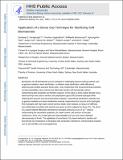Application of a dense gas technique for sterilizing soft biomaterials
Author(s)
Karajanagi, Sandeep S; Yoganathan, Roshan; Mammucari, Raffaella; Park, Hyoungshin; Cox, Julian; Zeitels, Steven M; Langer, Robert; Foster, Neil R; ... Show more Show less
DownloadAccepted version (973.2Kb)
Terms of use
Metadata
Show full item recordAbstract
Sterilization of soft biomaterials such as hydrogels is challenging because existing methods such as gamma irradiation, steam sterilization, or ethylene oxide sterilization, while effective at achieving high sterility assurance levels (SAL), may compromise their physicochemical properties and biocompatibility. New methods that effectively sterilize soft biomaterials without compromising their properties are therefore required. In this report, a dense-carbon dioxide (CO2)-based technique was used to sterilize soft polyethylene glycol (PEG)-based hydrogels while retaining their structure and physicochemical properties. Conventional sterilization methods such as gamma irradiation and steam sterilization severely compromised the structure of the hydrogels. PEG hydrogels with high water content and low elastic shear modulus (a measure of stiffness) were deliberately inoculated with bacteria and spores and then subjected to dense CO2. The dense CO2-based methods effectively sterilized the hydrogels achieving a SAL of 10-7 without compromising the viscoelastic properties, pH, water-content, and structure of the gels. Furthermore, dense CO2-treated gels were biocompatible and non-toxic when implanted subcutaneously in ferrets. The application of novel dense CO2-based methods to sterilize soft biomaterials has implications in developing safe sterilization methods for soft biomedical implants such as dermal fillers and viscosupplements. © 2011 Wiley Periodicals, Inc.
Date issued
2011Department
Massachusetts Institute of Technology. Department of Chemical Engineering; Harvard University--MIT Division of Health Sciences and TechnologyJournal
Biotechnology and Bioengineering
Publisher
Wiley
Citation
Karajanagi, S. S., et al. "Application of a Dense Gas Technique for Sterilizing Soft Biomaterials." Biotechnol Bioeng (2011).
Version: Author's final manuscript